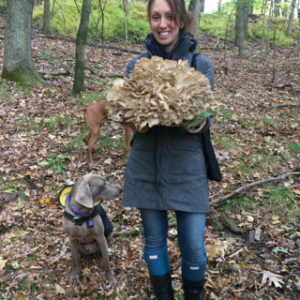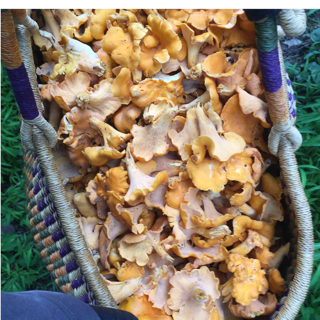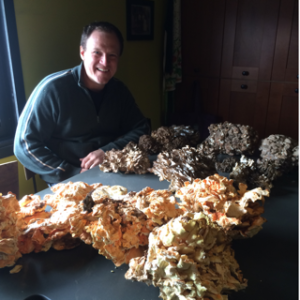The Magic of Mushrooms
The medicinal use of mushrooms has provided health benefits for centuries. Taken in powder forms, tinctures, teas or supplement form, mushrooms have incredibly powerful nutrient dense properties that have been studied and shown to help boost the immune system, fight cancer, promote heart health, reduce inflammation, balance hormones and contribute to a healthy gut. During these tumultuous times, increasing our immunity has been the forefront of nutrition and wellness over the last several months. Read on to learn about the Magic of Mushrooms!
What are mushrooms?
Although often mistaken for a vegetable, mushrooms actually fall into the category of fungi and are technically classified as their own kingdom. Mushrooms are highly nutritious, considered a delicacy in some cultures and are used in gourmet culinary cuisines across the globe. They contain many nutrients including protein, fiber, Selenium, Copper and Vitamins B1, B2, B12, C, E and D. Although, the amount of B12 is not quite as high as in animal products, it is the same form which makes it a non-animal based B12 source that is just as bioavailable as the B12 found in meat, which is pretty amazing. In addition, Vitamin D is very limited in food sources, mushrooms provide one of the few sources of Vitamin D that is consumed through diet.
Mushrooms contain several bioactive compounds including flavonoids, polyunsaturated fatty acids and Beta glucans. Beta glucans are a type of polysaccharide (a carbohydrate) found in mushrooms that have been researched extensively for its immune protective benefits as well as prebiotic properties to promote good gut health.
Mushrooms are versatile and can be prepared to eat or provided in powders, tinctures, supplements and teas for medicinal support. It is estimated that there are approximately 140, 000 different species of mushrooms on Earth and that only about 10 % of that (14, 000) are known. Given this info, it is estimated that there are at least another 7,000 more species of the 140, 000 that potentially provide health benefits. That is INSANE!!! Mushrooms are clearly powerful, mysterious and medicinal, which makes them pretty magical!
Benefits of Mushrooms
To date, most of the research on mushrooms has been done on animals or in vitro trials. However, early clinical trials are promising and suggest that intake of medicinal mushrooms may help to decrease risk of certain cancers and can also help alleviate cancer related symptoms such as insomnia and sweating. Additionally, emerging research is examining the health effects of mushrooms in over 130 different therapeutic properties including:
Anti-inflammatory: Medicinal mushrooms are considered potent anti-inflammatories. Mushrooms are packed with antioxidants, beta glucans and polysaccharides that can help reduce inflammation. A study using oyster mushrooms found that oral intake suppressed LPS-induced secretion of tumor necrosis factor-α, a substance in the body that causes inflammation.
Adaptogens: Adaptogens are herbs and plants that help to balance, restore and protect the body. Adaptogens help the body to adapt to stress by supporting and improving the adrenal system. The adrenal system is what ultimately controls our hormonal balance and body’s ability to respond to stress. Many factors can lead to an unbalanced adrenal system including diet and lifestyle. Mushrooms, have been shown to help balance hormones and reduce stress.
Gut Health: Mushrooms, specifically white button mushrooms, have been shown to help increase gut bacteria diversity. These findings ultimately conclude that by potentially adding mushrooms into the diet, the risk of certain diseases that are affected by microbial flora may be reduced. Since most disease theoretically begins in the gut, this information may help reduce risk or help to manage many diseases. Mushrooms contain high amounts of prebiotics which also help to stimulate the growth of commensal bacteria within the gut, leading to even more benefits of mushrooms for the gut.
Immune health: Gut bacteria play an essential role in the development and balance of the immune system. Therefore, gut health and immune health go hand in hand. A healthy microbiota acts as a barrier to pathogens, supports development and appropriate response of the immune system to threats, and supports tolerance to food antigens and harmless microbes. In addition, Mushroom supplementation has been shown to promote maturation and function of dendritic cells, which are the most important antigen-presenting cells that bridge innate and adaptive immunity, suggesting an enhanced development of adaptive immunity.
Our immune systems are very complex, as we have all acknowledged over thee last several months. Immunity protects us from disease and is affected by many things both inside and outside of our bodies. Our immune systems ultimately have to learn and understand what to protect us from including bacteria, viruses and even parasites. There are 2 main types of immune responses: Innate and Adaptive. One you are born with (innate) and one you learn (adaptive). Both work together to protect the body.
- Innate: Always on the prowl and ready for action against anything foreign that enters the body. It is alert and ready to attack. This response causes inflammation in the body by releasing White Blood Cells to help fight infection or threat. For example, when you get a virus, it causes a fever to fight the infection. Once the infection is gone, then the inflammation goes away along with the fever. Unless there is a constant threat which kicks the body into chronic inflammation. Ultimately, the innate immune system is your bodies first line of defense. If it can’t take care of the entire infection, the adaptive immune system will kick in.
- Adaptive: This system helps to fight specific infections and is learned. Unlike the innate immune system, the adaptive takes its time by taking in the foreign substance and analyzing its every detail. This is why it can take time once exposed to actually feel symptoms since it can take up to 7 days or longer to kick in. It is taking time to learn the behaviors and actions of the invader itself to learn how to attack it. It also has a great memory which allows it to fight off certain things over and over again, like the flu.
Understanding this process can make it easier to understand how the immune system works and how mushrooms benefit the immune system by helping to ultimately enhance our bodies ability to improve adaptive immunity.
Cancer Prevention: Mushrooms are packed with antioxidants, beta glucans and polysaccharides. Polysaccharides are immune-modulating substances, which help to enhance the body’s immune response.
A new study published In the international Journal of Cancer looked at the association between mushroom consumption and prostate cancer in over 36, 000 Japanese men between the ages of 40-79. Subject were followed for approximately 13 years. Frequent mushroom intake (more than one time per week) was associated with a lower incident of prostate cancer in subjects over the age of 50 vs men who consumed mushrooms less than one time per week. Additionally, researchers found a beneficial effect of mushroom consumption regardless of clinical stage of tumor development. The bottom line and conclusion from this study is that “habitual mushroom intake might reduce prostate cancer risk”.
Mushrooms Worth Discussing
Below is a small, but powerful, list that has been well-studied and researched proving health benefits:
Cordyceps: These mushrooms have been gaining increasing popularity in the fitness realm as this species may have an effect on increased oxygen uptake which may help to support higher endurance levels. In addition, Cordyceps are potentially helpful in supporting a healthy libido and enhance the body’s natural metabolic systems.
Reishi: Also known as the “medicine of kings”. Native to different parts of Asia, Reishi mushrooms provide anti-inflammatory, antioxidant and adaptogenic benefits, which means they help your body deal with negative effects of stress and help to normalize certain types of hormones. In addition, Reishi mushrooms are also rich in beta-glucans, which again helps to improve blood sugars, gut health and immunity. Although you might be able to find these in dry forms, due to its bitter taste and woody texture, Reishi is not typically used for cooking, but in powders and supplements.
Maitake: The famous “hen of the woods” are grown in the temperate hardwood forests, and have been the subject of many studies as they offer a wide range of health benefits. Among the benefits, evidence shows that maitake can boost the immune system, lower blood pressure, improve cholesterol, lower blood sugars, reduce weight and ultimately fight tumors by inhibiting the growth of cancer cells.

Photo: Heather Edmondson with Maitake aka Hen of the Woods
Chaga: Also known as “The King of Mushrooms”, might be the master of all immune supporting mushrooms. Used for hundreds of years, this species has beta-glucans, polyphenols, polysaccharides and antioxidant properties that all support our immune system and combat cancer. In addition, chaga mushrooms promote the production of healthful digestive enzymes that help to support a healthy gut and reduce bloating. Chaga may help to balance energy and reduce fatigue and mental sharpness. A great way to enjoy chaga is in tea.
Lion’s Mane: renowned for providing support to the nervous system and the brain. Lion’s Mane helps to promote mental focus, clarity and memory, as well as a high content of polysaccharides including beta-glucans that help to support the gut and immune system.
Turkey Tail: named ultimately for the extremely colorful and feather-like form, turkey tail is a real beauty. Not just in color, but in benefits! Known mostly for its immune boosting benefits, turkey tail symbolizes longevity and health in Asian culture. These mushrooms grown easily and abundantly making them one of the most common medicinal mushrooms found. Like most medicinal mushrooms, turkey tail additionally helps to decrease inflammation, fight cancer and ultimately boosts the immune system. Another great benefit that also supports the immune system is Turkey Tail helps aid digestion as it contains very specific prebiotics that help support a healthy gut. Since our gut comprises 70% of our immune system, you can add turkey to the list of ways to support the immune system.
Morels: One of the first signs of spring for the avid forager, is Morels! Morels are quite a delicacy since they are only grown in the wild, making it a highly desired mushrooms among chefs and mushroom lovers. With a honeycomb structure and meaty texture, even those that do not like mushrooms seem to enjoy the morels. Morels are packed with nutrients including iron, copper, manganese, zinc, selenium and vitamin D, to name a few. Morels provide antioxidant properties along with protein and fiber.

Photo: Nephew holding morels
Shiitake: Primarily used for centuries to help treat conditions like the common cold, these mushrooms are shown to help boost immunity, specifically due to the improvement in gut immunity and anti-inflammatory response.
Oyster: Oyster mushrooms are delicious and used wide in the culinary world. Benefits of these mushrooms are noted in research as having anti-cancer and anti-inflammatory properties.
Mushroom Supplementation
As you can see, there are a lot of great benefits to consuming mushrooms. Some are available to eat, others are needed in concentrated powders to maximize the best benefits. When selecting supplements, be sure to choose from a reputable company. You can find a list that we recommend here. A few options that I would highly recommend are:
Pure Encapsulations Innate Support: Contains reishi mushrooms to help promote respiratory, immune and GI health.
Klaire Labs Immunomax: a blend of mushroom powders including turkey tail, cordyceps, maitake, reishi and shitake to help boost immune health, reduce inflammation and provide anti-cancerous benefits
Metagenics Mycotaki: another blend of mushrooms to help support the immune system. This blend included oyster, reishi, turkey tail, cordyceps and maitake.
Thorne Myco-Immune: A blend of 7 mushrooms shown to provide significant immune support including caterpillar mushroom, maitake, shiitake, Reishi and turkey tail. This is in liquid form which makes it easy to add to liquids like smoothies.
Innate Response Formulas Adrenal Response Complete Care: a supplement designed to help support the adrenals by supplying a range of adaptogens. Additionally, mushrooms to help support mood and the stress response including reishi and cordyceps.
As always, be sure to check with your doctor or health professional before adding any new supplements to your daily routine.
Photo of Ryan Edmondson with foraged Maitake
“Hen of the Woods”(back) and chicken of the woods (front)
Buying and Storing
If you are lucky like me to have a mushroom forager in the family, then you know how amazing it is to taste a fresh mushroom picked in the wild that day and cooked in the evening. My brother and his wife love the outdoors and have been hunting mushrooms for almost 3 years. Their son, my nephew of almost 3, also loves mushrooms and helps them! Other than the fact that it is absolutely adorable, the idea of getting kids involved in the hunting and gathering of food has far more benefits than the actual hunting itself. Exposure to food, the outdoors and family time is powerful in shaping a child’s eating habits.
Buying
When we do not have the luxury of foraging, then buying is always an option. Although some mushrooms can be pricey, it pays to splurge on some wild mushrooms. You can often find at grocery stores or at farmer’s markets when in season. I enjoy buying in bulk so that I can carefully select each mushroom and examine its cleanliness, freshness and size. When possible, try to buy mushrooms whole vs sliced as they will last a little bit longer. In addition to fresh mushrooms, dried mushrooms are also a good option. They can be rehydrated and used for sauces or broths.
Storing
Even though mushrooms typically come in a plastic covered box, mushrooms do best when they can breathe. So, it is ideal to remove the wrap when you arrive home or place the mushrooms a brown paper bag if available. This way, they can breathe and retain their freshness for up to one week in the fridge.
Preparing
When you are ready to prepare, remove from bag, use a damp paper towel to lightly wash with water if needed to remove dirt and allow them to dry well. Nobody likes a waterlogged mushroom! They can become slimy, rubbery and have an overall unpleasant taste and texture. Mushrooms can be sautéed, grilled, or pickled! If sautéing, make sure you let all the water evaporate before removing from heat. In order to do so, make sure you do not overcrowd them and turn the heat up to allow the water to evaporate.
Cooking with Mushrooms
Here are a few of my favorite ways to eat mushrooms along with some delicious recipes.
- Add a mixture of mushrooms to stir-fry’s
- Marinated, lightly sautéed mushrooms with fresh ginger, liquid or coconut aminos, sesame oil and lemon make a delicious addition to a salad or antipasto plate!
- Ratatouille is a delicious eggplant and tomato dish that combines a variety of veggies and herbs into a saucy topping for rice and lentils.
- Mushroom Risotto never fails!
- Grilled Veggie Platter with whole mushrooms, asparagus, carrots, roasted red peppers and green beans. Follow us on Instagram to grab this recipe!
- Add Mushrooms to soups!
- Veggie Chili with mushrooms
- Enjoy fermented mushrooms on crackers or in salads!
- Make your own homemade mushroom broth from dehydrated mushrooms, onions, garlic and herbs!
- Enjoy mushrooms with eggs and sautéed spinach
- Tofu scramble with mushrooms, asparagus and red peppers. Add liquid aminos and nutritional yeast along with favorite herbs!
Safety Considerations
Mushrooms that have been considered edible are generally safe and healthy. More research is still needed to monitor the safety of high dosages used in powders or supplements. In addition, many wild mushrooms are toxic and poisonous to humans. Therefore, it is important to ensure that a mycologist or a qualified mushroom forager helps to identify the species before consuming.




